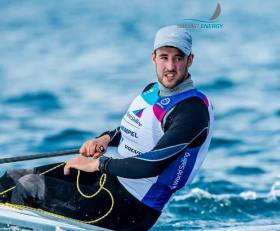Displaying items by tag: Fin Lynch
Finn Lynch Moves up to Eighth at the Laser Europeans in Bulgaria
The National Yacht Club's Finn Lynch moved up to eighth overall at the 2021 Laser European Championships in Bulgaria today, having scored two vital fifth places in final races three and four.
After six races sailed in the gold fleet and one discard, Lynch, a veteran of Rio 2016, was lying in 14th position last night but today's two top-five finishes in strong winds at the Port of Varna put Lynch firmly inside the coveted top ten. (Download results sheet below).
Ewan McMahon of Howth lies 25th and Liam Glynn 44th in the 49 boat gold fleet. McMahon's brother Jamie is competing in the silver fleet.
After a bad first race today, the overnight ILCA 7 leader Michael Beckett GBR (11-2-1) finally took two great results on the last races and secured the provisional first position with 30 points.
Pavlos Kontides CYP (8-1-12), Filip Jurisic CRO (1-11-3) and Jonatan Vadnai HUN (3-6-4) are close with 34, 39 and 43 points, respectively, so nothing is finalised yet.
Maxim Nikolaev RUS and Lorenzo Chiavarini GBR are fifth and sixth with 52 and 54.
Finn Lynch's Top Form Continues at World Sailing Cup in Genoa
On form Laser sailor Finn Lynch took a fifth in the first and only race of the day yesterday in light winds at the World Sailing Cup in Genoa, Italy.
"Very tough race and a great start to the regatta", the National Yacht Club declared who was lucky to get any sailing at all compared to other fleets.
Light winds hampered the schedule where nine Irish boats are competing.
Making their international debut in the 49erFX Annalise Murphy and Katie Tingle finished 16th in their only race placing them 26th overall after three races sailedin their 49-boat fleet.
Neither the 49ers or the Radials got any racing.
Full results are here.
Norway’s Hermann Tomasgaard and Croatia’s Tonci Stipanovic picked up the first Laser wins on the second day of racing in Genoa where over 700 sailors are racing.
Tomasgaard, winner at Miami, and Stipanovic, Rio 2016 silver medallist, took hard-earned yellow and blue fleet victories respectively in the 111-boat Laser pack.
The Italian city was hit with a light 5-6 knot wind on the second day of competition which meant that the split Laser fleet could only complete one race apiece.
Across the eight Olympic events, that features 676 registered sailors from 58 nations, only the 49erFX blue fleet were able to complete a race alongside the Lasers.
Stipanovic, sailing in the blue fleet, took a convincing victory and was full of praise for the race officials ashore after racing, "Compared to events I’ve been to recently, we had a Race Officer who could understand what was happening to the wind. He was changing the course nearly on every leg and the mark was always in the right place. It was a pleasure to be a part of the regatta today."
Stipanovic did indeed win a fair race in very challenging light conditions. He was followed by Dutch racer Duko Bos and Australia’s Luke Elliott.
Norway’s Tomasgaard also enjoyed the racing in the yellow fleet, snapping up the victory ahead of Sergey Komissarov (RUS) and Stefano Peschiera (PER). The Norwegian comes into Genoa off the back of an exceptional performance in Miami where he controlled the fleet and clinched gold with a day to spare.
He finished sixth at the recent Princesa Sofia Regatta in Palma, Mallorca and is aiming to recapture his Miami form.
"My starts were good in Miami but I had a tough time in Palma," commented Tomasgaard. "They were not as good and today’s start was not perfect either. It’s difficult to say where it went wrong but if you’re a second late it can make a huge difference. I’ve not been as on it recently.
"Racing is the best practice for the start. Once you make the acceleration you’ve got to go for it and go full speed."
Although he suffered a tough start, there was no issue with Tomasgaard’s performance throughout the rest of the race. He moved up from seventh at the first mark to clinch the victory. "In the beginning, I thought I was going to get caught in the middle like you often do in light wind but the group of us found pressure and moved forward."
After one race, Stipanovic and Tomasgaard share the lead and will be targeting a repeat performance on Wednesday.
Racing is scheduled to resume for the 49er, 49erFX, Laser and Nacra 17 at 11:00 today. The remaining fleets all have an additional race scheduled as they aim to catch up on races missed on Tuesday.






























































